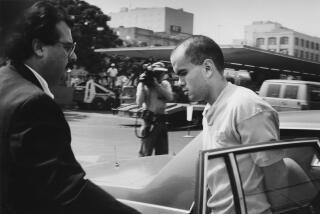Last of 3 Convicted in Slaying of ‘Bee Lady’ Gets Stiffest Sentence
- Share via
The last of three men convicted in the deaths of Anaheim’s “Bee Lady” and her daughter was given a maximum 25-years-to-life term on Thursday--the stiffest sentence of the three.
Elizabeth Schafer, who still raised bees and worked an avocado garden at age 96, and her 69-year-old daughter, Alice Schafer, died of asphyxiation after they were left bound and gagged following a nighttime robbery at their home at 1500 W. Broadway on Aug. 17, 1983.
Edward Barrios, 25, who pleaded guilty to first-degree murder, was given concurrent 25-years-to-life terms by Superior Court Judge James L. Smith despite the judge’s kind words to the man’s family that “if you could set aside this one night, I can truthfully say that I wish all our sons and daughters had done as well in life as Ed Barrios.”
Barrios’ co-defendants, Jerry Ulloa and Oscar Torres, who were 16 at the time of the slayings, are serving sentences with the California Youth Authority. Ulloa pleaded guilty and Torres was convicted of first-degree murder in 1984, but Torres’ sentence was reduced to second-degree murder by Superior Court Judge William W. Thomson.
Barrios’ attorney, Charles Margines, attempted to persuade Smith to give Barrios the same reduction to second-degree murder at a lengthy hearing Thursday, which would have meant a 15-years-to-life sentence.
Robert Schafer, Elizabeth Schafer’s son and Alice’s brother, asked the court Thursday for the maximum sentence for Barrios. His voice breaking with emotion, Schafer said that he, his two sisters and brother were all born and raised at the home where the killings occurred and that his mother had worked hard all her life, even in the last years, despite her advanced age. “She was a very special person,” he told the judge.
Deputy Dist. Atty. Melvin L. Jensen described Barrios as a catalyst in the robbery, insisting that the other two defendants were younger and did not have the nerve to attempt the robbery on their own. He also mentioned Barrios’ own statements to police that he guarded the two women, after they were bound and gagged while the others ransacked the house searching for money.
“He didn’t give them a chance to live,” Jensen said. “There was no anonymous phone call to police that maybe they should check on two elderly ladies tied up in a house.”
Barrios made his own direct plea for leniency from the judge.
“I’m sorry I hurt these people,” Barrios said. “I don’t like to hurt people. I just lost myself for a time.”
The judge did say he was impressed with Barrios’ excellent junior high and high school grade averages, and letters of support from not only family but from some of his former teachers. The judge also acknowledged several psychiatric and counseling reports which recommended favorable treatment for Barrios because of his lack of a criminal background and his need for therapy in prison.
Can’t Set Aside What Happened
But Smith added that no matter how much he might like Barrios “I can’t just set aside what happened on Aug. 17, 1983.”
The Orange County district attorney’s office was barred from seeking the death sentence for Barrios after a state appellate court ruled last fall that the case fell under a state Supreme Court ruling that the special circumstances doctrine--needed for a death penalty verdict--does not apply to a case where the death was unintentional.
Elizabeth Schafer became known as the Bee Lady during the 1970s when she successfully waged a City Hall fight with some of her neighbors over her beehives. For years she had a small stand in front of her home where she sold honey and avocados.
The morning after the robbery, she and her daughter Alice, who lived with her, were found dead by Robert Schafer, who had come over from his own Anaheim home to fix their breakfast. Both women were bound and gagged. Rope marks and the condition of the bed showed they both had struggled in attempt to free themselves.
Schafer, 62, a certified public accountant, expressed frustration that all of the attention in court seemed to focus on the defendant and his character.
Family Forgotten
“Sometimes you just feel like the victim’s family is forgotten,” he said. “Something should be done to somehow make it possible for us to endure the the pain.”
Schafer described how one sister has not been able to show up in court because of the emotional stress.
“It’s been a long three years,” Schafer said in the courtroom hallway later. “Maybe now we can all get on with our lives.”
During Torres’ trial, Liz Collins, 13, a great-granddaughter of the Bee Lady, admitted in court that she had mentioned to friends that the Schafers had money at their house and would be an easy target for a robbery.
Schafer told the court Thursday that he did not condemn the girl for what she did.
“She has her own sentence because she’s going to have to live with the results the rest of her life,” Schafer said.
Schafer added afterwards that he did not mind at all that his mother was referred to as the Bee Lady in all the publicity about the slayings.
“I was pretty proud of her for all that,” he said.
More to Read
Sign up for Essential California
The most important California stories and recommendations in your inbox every morning.
You may occasionally receive promotional content from the Los Angeles Times.













